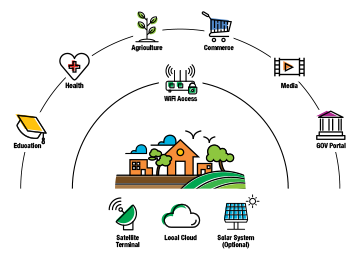Sub-Sahara governments have been looking for some time to harness new ICT technologies to improve living conditions through affordable and inclusive ICT services, and to help bridge the digital divide in remote and rural communities. With less than 40% of the population having access to internet connectivity, progress has been slow. Shortage in teachers and medical staff, especially in remote locations, also impacts the living conditions in many areas.
The spread of the COVID-19 pandemic led to the closure of schools and prohibition of public gatherings in many countries. This has created a ripple effect on the economy, businesses, civil services and on citizens overall well-being. Education and Health services are among the services most affected, and near-and long-term impact on the future of the youth (and adult) population can not be understated. The new reality has also demonstrated the importance of digital networks and services to economic resilience, the continuity of essential public services and overall social-economy wealth.
Israel-based satellite operator Spacecom believes that the response to these challenges should be effective and sustainable well through post pandemic life. By combining efforts with selected partners, Spacecom was able to design new ways to deliver efficient and cost effective access to crucial services to under-connected, un-connected and remote communities. “We use an integrated, holistic approach to providing access to modern services to the citizens, with the integration of modern digital technologies serving as the enabler of equitable, qualitative, and efficient delivery of SDG-related services for all,” said Dan Zajicek, CEO of Spacecom.

“Moreover, as part of Spacecom’s commitment to the community, “we were happy to join the Global Education Coalition for COVID-19 Response launched by UNESCO, with the aim to support the delivery of Quality Education in Sub-Sahara,” Zajicek added.
As cloud services rely on broadband internet access and stable electricity, “always-on connectivity” is at the core of Spacecom Digital Community Platform (DCP), utilizing AMOS satellites, with additional ICT building blocks and physical elements. All elements are integrated and reusable, allowing sustainable, scalable and cost-effective deployment of multi-sector solutions. These will be used by services in areas such as Education, Health, Agriculture, Banking, Finance, Commerce, filling Forms, applying for IDs and Passports and more.
Located at the heart of the communities, like Community Centers, Schools or Clinics, the DCP allows for modular design. It includes a satellite connectivity kit, a media server, Wi-Fi access hotspot and additional elements as required.
These can include:
It provides access to meSteering Sub-Saharan Communities to a Digital, Connected Future November 2020 25 dia-rich content stored locally or on the internet, specific for services as healthcare, education or agriculture, as well as entertainment, news, weather, government messages and OTT access to national broadcast, local TV and radio.
Spacecom’s cloud-based central management system, serves as a platform that manages a variety of applications, through secure, remote access, enabling service owners to safely access and manage their respective applications. The content management system manages the distribution of digital content, tools and applications between the cloud-based repository and the communities.
This provides quick syncing of crucial information, such as medical records or students home-schooling progress reports, while maintaining appropriate data privacy and security. To ensure effective use of local and remote resources and minimize operational costs, typically associated with satellite capacity, Spacecom has significantly reduced the satellite capacity OPEX while preserving high-quality communication by making use of satellite multicast efficiencies.
Inclusive digital transformation opens new opportunities for rural regions, enhance the digital and financial inclusion and promote digital literacy, thus reducing urban-rural gaps in living and in business conditions by addressing some of its root causes. “Spacecom’s and its partners goal is to empower remote communities, with an emphasis on scalable digital solutions that will impact the lives of millions and allow governments to increase the efficiency, security and effectiveness of their public services. For us digital equality is not just a slogan, it is the basic right and need of modern life of every citizen everywhere, and we are working hard to enable it,” said Zajicek.


